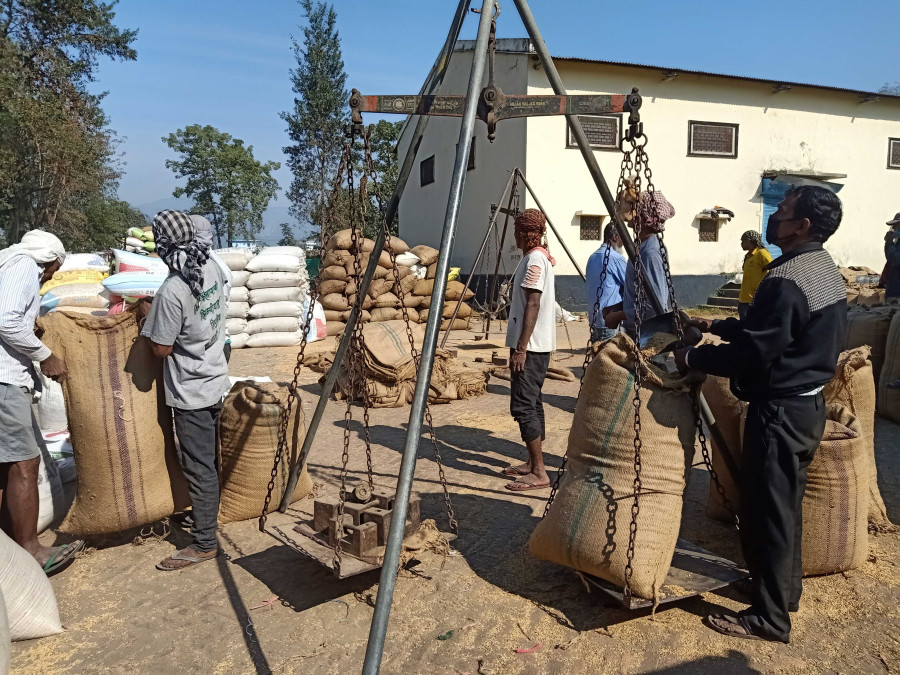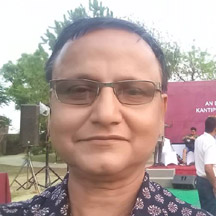Money
Paddy farmers throng government depots to sell staple
Food Management and Trading Company is offering farmers Rs500 per quintal more than the market price.
Mohan Budhyar & Kamal Panthi
Paddy farmer Khagendra Bhatta of Dodhara Chadani, Kanchanpur took his harvest to sell to the government food company in Mahendranagar, even though it was several hours' journey, as he had heard that he could get a good price there.
Bhatta piled his paddy on a tractor and crossed the Mahakali River to reach Mahendranagar. Halfway across, water got inside the tractor, making him very worried.
But he was convinced he had made a good decision. "The paddy price is very low in my village," he said.
People had told Bhatta that state-owned Food Management and Trading Company, formally Nepal Food Corporation, would offer him a better price. And they were right. The government company paid Rs500 per quintal more than the prevailing market price.
Farmer Hira Ram Rana of Geta, Godavari Municipality, Kailali was also able to sell his paddy to the government firm after many years. Another farmer from Geta, Aalaram Rana, sold 25 quintals of paddy to the company. This was his first time doing business with it.
In the past, farmers were never able to get a fair price for their paddy as layers of traders used to be involved in fixing the prices as soon as the harvest started.
Powerful traders would collude with the company employees to set paddy prices at a level lower than the market rate. This forced farmers to sell their crop at the prices fixed by the traders.
In 2016, the government started setting the minimum support price for paddy to ensure that farmers got a fair deal, but the actual prices were always lower than the official prices, farmers said.
The state-owned company was in cahoots with the traders, and it would delay announcing the minimum support price. The farmers, hard up for cash, would sell their crop for whatever they could get in the market.
This year, the scenario is different. Paddy farmers in Kailali and Kanchanpur are selling their crops directly to the company as the rates for this harvest season have already been announced, and they are higher than the market rates fixed by the traders.
"There was a strong nexus between the traders and the company’s employees. It has ended this year,” Bhatta said.
This year, the minimum support price of common paddy has been hiked to Rs28.85 per kg, from Rs26.73 last year. The minimum support price for ‘mota dhan’ (short grain) has been set at Rs27.35 per kg, up from Rs25.32 last year.
The company is currently buying paddy from farmers at the minimum support price announced by the government. The prices offered by traders this year ranges from Rs22 to Rs24 per kg, depending on the product quality.
Paddy farmer Suraj Shah of Godavari was complaining that the company did not pay him immediately as it was supposed to. He had to wait for hours for his turn to collect the money because of the large number of people at the depot. Shah had never seen such a big crowd of farmers selling their products before.
The company said they were expecting a surplus even though they have a fixed quota to purchase.
Anil Kumar Shrestha, chief of Food Management and Trading Company in Kanchanpur, said they aimed to procure 6,500 tonnes of paddy this year. "It seems there will be a surplus," he said. As of Wednesday, the company had purchased more than 2,500 tonnes of paddy.
Shrestha said that the company could complete the procurement of paddy as per the target within a week and a half. "As we don’t have enough manpower to weigh the paddy at the company’s procurement centre, work has been delayed,” he said, adding that the centre had not been able to weigh the paddy piled up on its premises for the last two days.
“This is the first time in a decade that the company is procuring paddy as per the target."
The company has set up procurement depots in Geta, Mohanpur, Bhajani, Joshipur and Tikapur of Kailali.
The crowd of farmers coming to sell their paddy is growing by the day, but the government has a fixed procurement quota.
Raghu Nath Joshi of Bhimdatta Municipality had come to the company to ask if it would be procuring paddy. "I sold some in the market and have a little remaining," he said. "The price is good here. I got very little in the market."
Topendra Upadhyaya, head of the company in Mahendranagar, said that as there is a fixed quota to purchase paddy, they would not be able to buy all the paddy brought by the farmers.
According to him, they have a quota to purchase 7,000 quintals of paddy this year. So far, the company has bought 4,500 quintals. "As farmers are bringing paddy in large quantities, we have asked the head office to increase the quota,” he said.
The company has been procuring paddy through the token system this year, and has distributed tokens to the farmers as per the approved quota.
“More farmers are coming to get tokens,” said Upadhyaya. Farmers of Bedkot, Shuklaphata, Belauri and Beldadi areas of Bhimdatta Municipality are coming to sell paddy.
Jog Bahadur Chaudhary of Janaki Rural Municipality-6 of Kailali has to thresh about 200 quintals of paddy. Although the company has started buying paddy, he has not been able to get a token.
"We get Rs500 more per quintal of paddy. Selling 200 quintals will give me an extra Rs100,000," said Chaudhary. But Chaudhary is worried that the company has already fulfilled its quota.
Paddy is cultivated on 50,000 hectares in Kanchanpur. Paddy production has increased this year due to timely and regular monsoon rains.
Farmers like Chaudhary have complained that it’s not easy to sell paddy to the state-owned company.
Bhoj Raj Chaudhary of Janaki Rural Municipality-3, said they have to wait for three to four days to sell their crop. Surat Chaudhary of Tikapur Municipality-1, who went to the company's procurement centre to sell paddy, said his turn came only after three days. With lots of difficulties, he was able to sell 8 quintals of paddy. But he is happy to get better prices.
The company's Tikapur procurement centre aims to procure 65,000 quintals of paddy from farmers this year, said Chetman Kathayat, head of the centre. “There are hundreds of vehicles lined up to sell paddy at the centre.”
In Nepalgunj, the company’s premises have been inundated by farmers. People are seen lined up on the road outside the company. The police had to be mobilised to manage the crowd.
Irsad Sai of Janaki Rural Municipality-5, Budhiya has been waiting for a coupon to sell 100 quintals of paddy. He said that he had paid Rs100 per quintal as freight.
Jagatram Verma of Rajha, Nepalgunj had 120 quintals of paddy, but he got a coupon to sell only 50 quintals. “Many farmers are not able to sell their paddy on time because the company has only a few weighing machines," said Verma.
Paddy farmers of Banke are compelled to go to the company office in Nepalgunj to sell paddy.
Nirmal Thapa, department head of the company’s Nepalgunj office, said that the farmers were facing problems even after the process of purchasing paddy was made systematic. "We have started a coupon system to manage the crowd due to the pandemic," he said.
The company has a target to purchase 40,000 quintals of paddy this fiscal year.
The office of Food Management and Trading Company in Rajapur, Bardia has stopped buying and selling paddy due to lack of bags.
Radheshyam Tharu of Geruwa Rural Municipality-3 said that, as a result, middlemen and traders were taking advantage and buying paddy from farmers at a lower price.
He said that traders were paying Rs300 per quintal less than the minimum support price set by the government.
The Bardia procurement centre has a target to purchase 45,000 quintals of paddy this year. Last year, the centre procured 48,000 quintals of paddy from the farmers.
(With inputs from Bhawani Bhatta in Kanchanpur, Ganesh Chaudhary in Tikapur and Rupa Ghatraj in Nepalgunj)




 9.7°C Kathmandu
9.7°C Kathmandu
















